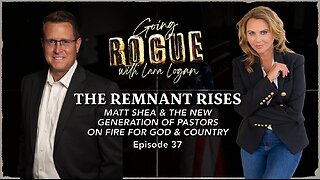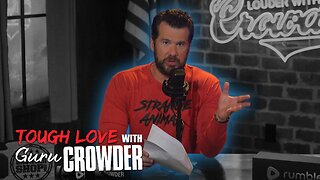Premium Only Content

'Raymond Newman Interviews Ayn Rand' (1980)
The 1980 interview between Ayn Rand and Raymond Newman—one of the last recorded public conversations before her death in 1982—offers a revealing and concise summation of Rand’s philosophy, personality, and worldview. Hosted on The Raymond Newman Journal, a little-known but serious interview platform, the conversation stands out not for its production values but for the clarity and firmness with which Rand presents her ideas. Despite her declining health, Rand remains intellectually sharp, offering a passionate defense of reason, individualism, and moral judgment.
The tone of the interview is notably respectful and reflective, even as Rand tackles deep philosophical issues with characteristic intensity. Newman asks questions that touch on themes such as life’s meaning, the role of reason in human existence, the importance of moral certainty, and the proper relationship between the individual and society. His questions are delivered with a quiet, almost deferential tone, allowing Rand space to elaborate without interruption or challenge. The result is a kind of intimate intellectual portrait—one that shows Rand in full command of her ideas but also more relaxed and accessible than in earlier, more combative settings.
Rand begins by reiterating the foundational principle of her philosophy: that reason is man’s only means of knowledge. She connects this to the purpose of life itself, arguing that the goal of existence is not mere survival, but the pursuit of happiness through the exercise of rational values. Unlike philosophies that ask individuals to surrender their interests to a collective ideal, Rand insists that each person has a moral right to live for their own sake—a theme that recurs frequently throughout the interview.
One of the interview’s most poignant moments comes when Newman asks Rand what gives life meaning. Her answer is deeply personal yet consistent with Objectivism: she states that purpose, achievement, and love are central to a meaningful existence—but only when grounded in values chosen through rational thought. This is not a sentimental view of life’s meaning, but one shaped by conscious effort and moral integrity.
Rand also addresses the danger of moral relativism, which she sees as a cultural and philosophical crisis of the modern age. She condemns the trend toward "nonjudgmentalism", arguing that refusing to judge is itself a kind of moral abdication. In Rand’s view, the health of a society depends on individuals making rational, objective moral evaluations—and standing by them with certainty.
Though the interview doesn’t delve into specific political controversies, Rand briefly criticizes statism, altruism, and the intellectual decline of the West, especially among academics and cultural leaders. She reiterates that capitalism—not just as an economic system, but as a moral one—is the only political framework compatible with human nature and individual rights.
Unlike her earlier media appearances, such as her famously tense interview with Mike Wallace in 1959 or her combative debates in the 1960s, this interview shows Rand in a more reflective state. Her voice is slightly weakened by age, but her clarity of thought is undiminished. There is a sense of summation—of a philosopher surveying the arc of her life and the enduring relevance of her ideas.
Conclusion
The Raymond Newman Journal interview is a valuable and underappreciated piece of Ayn Rand’s legacy. It distills her Objectivist philosophy into a conversational form that is both intellectually rigorous and emotionally revealing. Far from a combative debate or a political polemic, the interview presents a Rand who is thoughtful, principled, and unwavering in her commitment to reason, individualism, and the moral dignity of the human being. For both longtime admirers and curious newcomers, this late-life conversation serves as a powerful entry point into the mind of one of the 20th century’s most controversial and influential thinkers.—one of the last recorded public conversations before her death in 1982—offers a revealing and concise summation of Rand’s philosophy, personality, and worldview. Hosted on The Raymond Newman Journal, a little-known but serious interview platform, the conversation stands out not for its production values but for the clarity and firmness with which Rand presents her ideas. Despite her declining health, Rand remains intellectually sharp, offering a passionate defense of reason, individualism, and moral judgment.
The tone of the interview is notably respectful and reflective, even as Rand tackles deep philosophical issues with characteristic intensity. Newman asks questions that touch on themes such as life’s meaning, the role of reason in human existence, the importance of moral certainty, and the proper relationship between the individual and society. His questions are delivered with a quiet, almost deferential tone, allowing Rand space to elaborate without interruption or challenge. The result is a kind of intimate intellectual portrait—one that shows Rand in full command of her ideas but also more relaxed and accessible than in earlier, more combative settings.
Rand begins by reiterating the foundational principle of her philosophy: that reason is man’s only means of knowledge. She connects this to the purpose of life itself, arguing that the goal of existence is not mere survival, but the pursuit of happiness through the exercise of rational values. Unlike philosophies that ask individuals to surrender their interests to a collective ideal, Rand insists that each person has a moral right to live for their own sake—a theme that recurs frequently throughout the interview.
One of the interview’s most poignant moments comes when Newman asks Rand what gives life meaning. Her answer is deeply personal yet consistent with Objectivism: she states that purpose, achievement, and love are central to a meaningful existence—but only when grounded in values chosen through rational thought. This is not a sentimental view of life’s meaning, but one shaped by conscious effort and moral integrity.
Rand also addresses the danger of moral relativism, which she sees as a cultural and philosophical crisis of the modern age. She condemns the trend toward "nonjudgmentalism", arguing that refusing to judge is itself a kind of moral abdication. In Rand’s view, the health of a society depends on individuals making rational, objective moral evaluations—and standing by them with certainty.
Though the interview doesn’t delve into specific political controversies, Rand briefly criticizes statism, altruism, and the intellectual decline of the West, especially among academics and cultural leaders. She reiterates that capitalism—not just as an economic system, but as a moral one—is the only political framework compatible with human nature and individual rights.
Unlike her earlier media appearances, such as her famously tense interview with Mike Wallace in 1959 or her combative debates in the 1960s, this interview shows Rand in a more reflective state. Her voice is slightly weakened by age, but her clarity of thought is undiminished. There is a sense of summation—of a philosopher surveying the arc of her life and the enduring relevance of her ideas.
Conclusion: The Raymond Newman Journal interview is a valuable and underappreciated piece of Ayn Rand’s legacy. It distills her Objectivist philosophy into a conversational form that is both intellectually rigorous and emotionally revealing. Far from a combative debate or a political polemic, the interview presents a Rand who is thoughtful, principled, and unwavering in her commitment to reason, individualism, and the moral dignity of the human being. For both longtime admirers and curious newcomers, this late-life conversation serves as a powerful entry point into the mind of one of the 20th century’s most controversial and influential thinkers.
-
 LIVE
LIVE
Side Scrollers Podcast
2 hours agoUK Introduces MANDATORY Digital ID + Dallas ICE Shooting BLAMED on Gaming + More | Side Scrollers
516 watching -
 LIVE
LIVE
Dr Disrespect
2 hours ago🔴LIVE - DR DISRESPECT - ARENA BREAKOUT: INFINITE - STORM EVENT
1,350 watching -
 LIVE
LIVE
Lara Logan
11 hours agoTHE REMNANT RISES: Matt Shea & The New Generation of Pastors on Fire for God & Country | Episode 37
158 watching -
 LIVE
LIVE
Nikko Ortiz
4 hours agoADHD, Crashouts, and Karens - Rumble LIVE
333 watching -
 49:21
49:21
Steven Crowder
3 hours agoWhy She's Wrong and other Life Advice from Steven Crowder
151K95 -
 48:24
48:24
The Rubin Report
2 hours agoPress Stunned by Trump’s Brutally Honest Reaction to James Comey Question
28.6K14 -
 1:02:42
1:02:42
VINCE
4 hours agoComey Indicted, Soros Exposed: The Powder Keg Just Exploded | Episode 134 - 09/26/25
216K264 -
 DVR
DVR
Bannons War Room
7 months agoWarRoom Live
38.3M8.88K -
 1:45:34
1:45:34
Benny Johnson
3 hours ago🚨James Comey INDICTED for Perjury and Obstruction, Years In JAIL | 275 FEDS in January 6th Crowd
60.2K89 -
 1:35:48
1:35:48
Dear America
5 hours agoBOMBSHELL: 274+ Feds Where in The Crowd On Jan 6th!! + James Comey Finally INDICTED!!
142K105